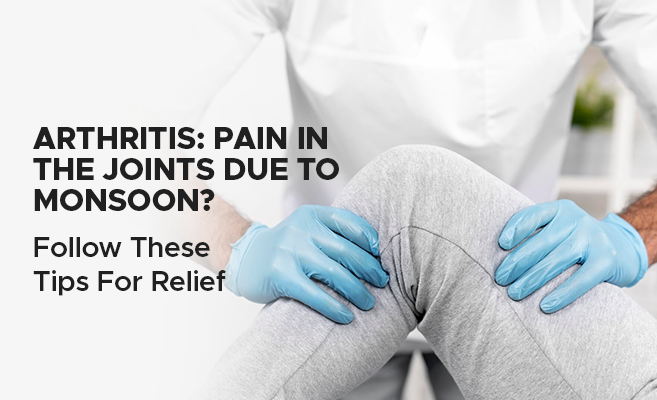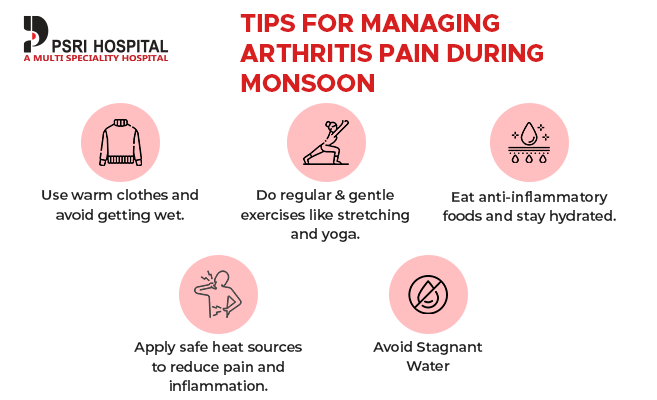Arthritis: Pain In The Joints Due To Monsoon? Follow These Tips For Relief

The monsoon season can bring relief from the scorching heat, but for many arthritis patients, it can also bring increased joint pain and discomfort. With the right care and precautions, however, you can manage and even reduce this pain effectively. If you’re experiencing severe arthritis pain, it’s essential to seek treatment from the best hospital in Delhi. So, here’s a comprehensive guide for you on how to manage joint pain effectively during the rainy season.

Causes Of Joint Pain During Monsoon Season
- Humidity and Pressure Changes: During the monsoon, barometric pressure often fluctuates. These changes can cause tissues in the joints to expand, leading to increased pain and discomfort for arthritis patients.
- Inflammation: Excessive humidity can make joint inflammation worse. Because arthritis is primarily caused by inflammation, people with arthritis find the rainy season especially difficult.
- Lack of Exercise: The rainy weather can limit your outdoor activities, which reduces physical activity. When joints are not moved regularly, they can become stiff and painful, making arthritis symptoms worse..
- Cold Weather: The drop in temperature can also affect the joints. Cold weather can make the joints stiff and more painful, which is a common complaint among arthritis sufferers during this season.
Effective Tips To Manage Joint Pain During The Rainy Season
- Stay Warm: Keeping yourself warm can help reduce joint stiffness. Use warm clothes, and avoid getting wet in the rain.
- Exercise Regularly: Gentle exercises like stretching, yoga, and swimming can keep your joints flexible and reduce pain. Consult a doctor before starting any new exercise regimen.
- Balanced Diet: A diet rich in anti-inflammatory foods like omega-3 fatty acids, fruits, and vegetables can help manage arthritis pain. Avoid processed foods and sugar.
- Stay Hydrated: Drinking plenty of water helps maintain joint lubrication and can reduce pain.
- Massage and Physiotherapy: Regular massages and physiotherapy sessions can improve blood flow and reduce stiffness in the joints.
Home Remedies For Joint Pain Relief
- Warm Compress: Warm Compress: Applying heat sources like warm water, microwaveable pads, wheat packs and electrical or chemical pads to the affected joints can help reduce pain and inflammation. The heat improves blood flow to the area, which can relax muscles and ease discomfort.
- Epsom Salt Bath: Epsom Salt Bath: If you have joint pain, taking a soak in an Epsom salt bath might help a lot. Pain is relieved by the magnesium in Epsom salts, which also helps to relax muscles and reduce inflammation..
- Herbal Teas: Drinking teas made from anti-inflammatory herbs like ginger and turmeric can help manage arthritis pain. These herbs have natural anti-inflammatory properties that can reduce swelling and discomfort in the joints.
Medical Treatments and Surgeries
If home remedies and lifestyle changes don’t bring sufficient relief, medical treatments might be necessary. Some of the options available at the top hospitals in Delhi NCR include:
- Medication: To help treat arthritis pain, doctors can prescribe nonsteroidal anti-inflammatory medicines (NSAIDs) and other pain relievers. These medications can reduce inflammation and relieve pain effectively.
- Physical Therapy: Regular sessions with a physical therapist can improve joint function and reduce pain. Physical therapy includes exercises and treatments that help maintain flexibility and strength in the joints.
- Knee Replacement Surgery: For severe cases of arthritis, knee replacement surgery in Delhi is the most effective option. This surgery involves replacing the damaged joint with an artificial one, which can significantly reduce pain and improve mobility. It is often recommended when other treatments are unable to relieve the pain.
Ways to Prevent Vector-Borne Diseases During Monsoon
Arthritis patients are often at risk of infections, including vector-borne diseases that are common during the monsoon. Here are some preventive measures:
- Avoid Still Water: Sitting or slow moving water serves as a breeding ground for mosquitoes. Hence make sure that there are no water collections around your house.
- Use Mosquito Repellents: Apply mosquito repellents without any fail during monsoon on exposed skin and use mosquito nets while sleeping.
- Wear Protective Clothing: Wear long-sleeved shirts and pants to protect yourself from mosquito bites.
- Keep Your Surroundings Clean: Regularly clean your home and surroundings to prevent the breeding of mosquitoes and other vectors.
Conclusion
While managing arthritis pain during the monsoon can be challenging, taking proactive and cautious steps can make a significant difference. It’s essential to stay warm, exercise regularly, and maintain a balanced diet to keep your joints healthy. For those seeking professional medical treatment, PSRI Hospital is one of the best hospitals in Delhi which offers comprehensive arthritis care, including advanced treatments and surgeries. Don’t let the monsoon bring down your spirits, take control of your arthritis and enjoy the season with these effective strategies.
FAQs
Why does arthritis pain increase during the monsoon?
Ans: Humidity and pressure changes cause tissues to expand, leading to increased joint pain.
What are some effective home remedies for joint pain?
Ans: Warm compresses, Epsom salt baths, and herbal teas like ginger and turmeric can provide relief.
Can exercise help manage arthritis pain during the monsoon?
Ans: Yes, gentle exercises like stretching, yoga, and swimming can keep joints flexible and reduce pain.
What should I do if home remedies don’t relieve my arthritis pain?
Ans: Consult a doctor for medical treatments such as NSAIDs, physical therapy, or consider knee replacement surgery.
How can I prevent vector-borne diseases during the monsoon?
Ans: Avoid stagnant water, use mosquito repellents, wear protective clothing, and keep your surroundings clean.

 Book An Appointment
Book An Appointment Virtual Consultation
Virtual Consultation





